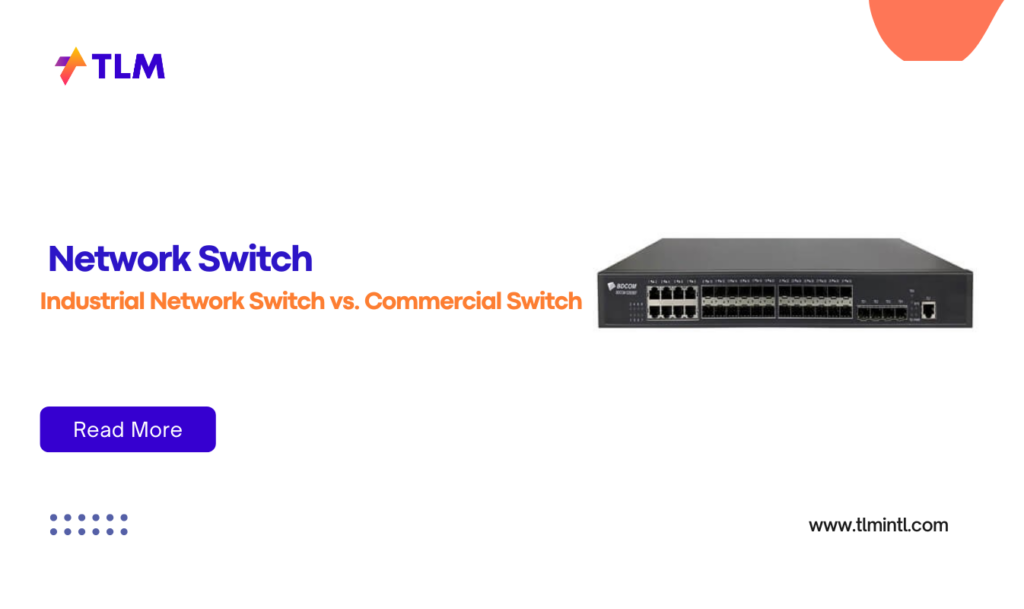In today’s connected world, selecting the right network switch is crucial for ensuring seamless data flow, reliability, and performance. Whether you’re setting up a small office network or managing a large industrial automation system, the choice between an industrial network switch and a commercial network switch can significantly impact your operations. Each type of switch is designed with specific environments in mind, and understanding their differences will help you make an informed decision.
This article will walk you through the key differences between industrial and commercial switches, their best use cases, and why choosing the right one can make or break your network infrastructure.
Industrial Network Switch Overview
An industrial network switch is built to withstand harsh environmental conditions while providing reliable, high-speed data transmission. These switches are typically used in industries like manufacturing, oil and gas, transportation, and utilities, where extreme temperatures, humidity, dust, and vibrations are common.
Key Features of Industrial Network Switches
Durability
Industrial switches are designed with rugged enclosures that protect them from dust, moisture, and other environmental hazards. They often come with high ingress protection (IP) ratings like IP40 or higher.
Wide Temperature Range
These switches can operate in extreme temperatures ranging from -20°C to 70°C or more. This makes them ideal for outdoor installations or environments like factory floors where temperature fluctuations are common.
Redundancy Features:
To ensure continuous operation even during failures, industrial switches often support redundancy protocols like Rapid Spanning Tree Protocol (RSTP) and Redundant Link Aggregation (LAG). These features help prevent downtime by automatically rerouting traffic in case of a failure.
Long Lifespan:
Industrial switches are built to last over a decade, reducing maintenance costs in the long run.
Environmental Adaptability:
These switches are resistant to electromagnetic interference (EMI) and can withstand shocks and vibrations common in industrial settings.
Common Applications
Industrial network switches are commonly used in:
- Manufacturing plants
- Oil and gas refineries
- Power stations
- Transportation systems (e.g., railways)
- Smart grids
- IoT-enabled factories
Commercial Network Switch Overview
A commercial network switch, on the other hand, is designed for use in controlled environments such as offices or data centers. These switches prioritize cost-effectiveness while offering essential networking functionalities for businesses that don’t require ruggedized equipment.
Key Features of Commercial Network Switches
Basic Durability
Commercial switches are typically housed in plastic or lightweight metal enclosures designed for indoor use. They lack the ruggedness needed for harsh environments but perform well in temperature-controlled spaces.
Standard Temperature Range
Commercial switches usually operate within a temperature range of 50°F to 95°F (10°C to 35°C), making them unsuitable for extreme environments.
Cost-Effective
These switches are more affordable than their industrial counterparts because they don’t require specialized materials or advanced durability features.
Shorter Lifespan
Commercial switches have a lifespan of about three years, which may be sufficient for small businesses but could lead to higher replacement costs over time.
Basic Networking Features
While they lack advanced redundancy features, commercial switches offer essential functionalities such as Power over Ethernet (PoE), VLAN support, and Gigabit Ethernet.
Common Applications
Commercial network switches are ideal for:
- Small to medium-sized businesses (SMBs)
- Office networks
- Data centers
- Schools and universities
- Retail stores
Key Differences Between Industrial and Commercial Network Switches
To better understand how these two types of switches differ, let’s break it down into several critical factors:
| Feature | Industrial Network Switch | Commercial Network Switch |
| Durability | Rugged design with IP40+ protection1 | Basic enclosures suitable for indoor use1 |
| Operating Temperature | -20°C to 70°C or higher1 | 10°C to 35°C (50°F to 95°F)1 |
| Lifespan | Over 10 years1 | Around 3 years1 |
| Redundancy Features | Supports RSTP, LAG for fault tolerance2 | Limited redundancy features |
| Ingress Protection (IP) | High IP rating (IP40+)1 | Low IP rating |
| Cost | Higher upfront cost due to specialized materials | More affordable |
| Applications | Harsh environments like factories and outdoors | Controlled environments like offices |
Best Use Cases: When to Choose an Industrial vs. Commercial Switch
Choosing between an industrial or commercial switch depends largely on your specific environment and operational needs. Below are some guidelines on when each type of switch is most appropriate:
When to Choose an Industrial Network Switch
You should opt for an industrial switch if:
- Your environment experiences extreme temperatures or humidity.
- You need a switch that can withstand dust, dirt, moisture, or vibrations.
- Downtime is not an option due to critical operations—redundancy features like RSTP will ensure continuous operation.
- You require long-term reliability with minimal maintenance.
Example Use Case:
In a manufacturing plant where machines generate heat and dust, an industrial switch ensures that data flows uninterrupted between machines on the production line. The rugged design prevents damage from environmental factors while redundancy protocols maintain uptime even if one connection fails.
When to Choose a Commercial Network Switch
A commercial switch is ideal if:
- Your environment is temperature-controlled (e.g., office spaces).
- You need basic networking features without the need for rugged protection.
- Cost is a significant factor—commercial switches offer an affordable solution for SMBs.
- The network does not require advanced redundancy features.
Example Use Case:
In a small office setup where employees need stable internet access for daily tasks like emailing and video conferencing, a commercial switch provides adequate performance at a lower cost. Since the environment is controlled, there’s no need for extra protection against environmental factors.
Companies Selling Industrial and Commercial Switches in UAE
Several companies in the UAE market offer both industrial and commercial network switches from leading brands:
1. Cisco
Cisco offers a wide range of both industrial-grade and commercial network switches. Their industrial products include ruggedized models designed specifically for harsh environments with support for IoT applications. For commercial use cases, Cisco provides Catalyst series switches that offer high performance at an affordable price point.
2. Moxa
Moxa specializes in industrial networking products designed for mission-critical applications such as transportation systems and smart grids. Their industrial Ethernet solutions include unmanaged and managed switches that can withstand extreme conditions.
3. HPE-Aruba
HPE-Aruba provides both enterprise-level commercial switches as well as more robust options suitable for light industrial applications. Their products focus on scalability and security features that cater to both office environments and larger networks requiring high availability.
4. Juniper Networks
Juniper Networks offers high-performance networking solutions that include both commercial-grade Ethernet switches as well as ruggedized options suitable for industrial applications. Their products are known for their reliability and scalability across various sectors including manufacturing.
Conclusion: Which Network Switch Is Right For You?
In summary, choosing between an industrial network switch and a commercial one comes down to understanding your operational environment: If you’re working in harsh conditions where reliability is paramount—such as factories or outdoor installations—an industrial switch is your best bet due to its durability, redundancy features, and long lifespan. For controlled environments like offices or schools where cost-efficiency matters more than ruggedness, a commercial switch will provide all the necessary functionalities without breaking the bank.






